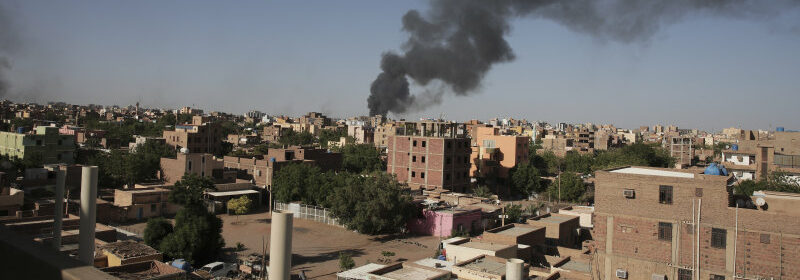Civilians flee Khartoum as Sudanese rivals attempt another truce

Save articles for later
Add articles to your saved list and come back to them any time.
Key points
- Sudan’s rival generals agreed to attempt a fresh 24-hour humanitarian cease-fire.
- Sporadic fighting continued and aid groups sought to help trapped civilians.
- Residents of the capital have been running out of food and other supplies as they shelter in their homes.
- Nearly 300 people have been killed in the past five days, the UN health agency said, but the toll is likely higher.
Khartoum, Sudan: Sudan’s rival generals on Wednesday made a new attempt at a 24-hour humanitarian cease-fire after a failed truce the night before. But sporadic fighting continued, and aid groups said they needed guarantees and a wider window to help civilians trapped by five days of intense urban combat.
Terrified Sudanese fled Khartoum earlier in the day, hauling whatever belongings they could carry and trying to get out of the capital, where forces loyal to the country’s top two generals have been battling each other with tanks, artillery and airstrikes since Saturday.
Terrified Sudanese are fleeing their homes in the capital Khartoum, witnesses say, after one internationally brokered cease-fire failed and rival forces battled in the capital for a fifth day. Credit: AP
The fighting became less intense in the first hours after the cease-fire took effect at 6pm, with sporadic clashes continuing in the city centre, said Atiya Abdalla Atiya, secretary of the Doctors’ Syndicate, who is still in the capital. But he said neither side has provided guarantees to his group to facilitate movement of health care workers and ambulances.
Desperate residents of the capital have been running out of food and other supplies as they sheltered in their homes from the gun battles on the streets outside. Hospitals have been damaged and forced to close or have been overwhelmed by wounded, with staff exhausted and medical supplies depleted. Increasingly, armed fighters have turned to looting shops and robbing anyone who dares step outside.
Nearly 300 people have been killed in the past five days, the UN health agency said, but the toll is likely higher because many bodies lie uncollected in the streets.
In the tense hours after Wednesday’s cease-fire, Abdalla al-Tayeb joined other residents in collecting bodies near the main military headquarters, the scene of intense fighting. “All of them nearly rotted, causing a foul smell that reached our homes,” he said. “The scene was heinous.”
People walk past shuttered shops in Khartoum.Credit: AP
After the failure of Tuesday evening’s truce attempt, hundreds gave up on trying to hold out for calm and fled their homes throughout the day, even as explosions and gunfire shook Khartoum and the adjacent city of Omdurman. Residents of multiple neighbourhoods told The Associated Press they could see men, women and children leaving with luggage, some on foot, others crowding into vehicles.
On Wednesday evening, the army and its rivals, the paramilitary Rapid Support Forces, separately announced that a new 24-hour truce had begun.
White House press secretary Karine Jean-Pierre called for both sides to adhere to the truce, “renounce violence and return to negotiations.” She said the army and the RSF “are responsible for ensuring the protections of civilians and non combatants.”
A satellite photo shows fires burning at Khartoum International Airport in Khartoum, Sudan.Credit: Planet Labs PBC/AP
Until now, army chief General Abdel Fattah Burhan, and RSF commander General Mohammed Hamdan Dagalo — former allies against Sudan’s pro-democracy movement — have seemed determined to crush each other in their struggle for power.
Tuesday’s cease-fire attempt failed even after US Secretary of State Antony Blinken spoke to each general by phone and after pressure from their regional allies. Egypt, which backs the Sudanese military, and Saudi Arabia and the United Arab Emirates, which have close ties to the RSF, have been calling on all sides to stand down.
Throughout the day Wednesday, the two sides battled around the main military headquarters in central Khartoum, which the RSF has tried repeatedly to capture, and the nearby airport. Residents said the military was pounding RSF positions with airstrikes.
The army’s monopoly on air power has appeared to give it an edge in fighting in Khartoum and Omdurman, enabling it to take several RSF bases over the past few days. But tens of thousands of fighters from the paramilitary force have fanned out across the city.
Residents say armed men, mostly in RSF uniforms, have raided homes, offices and shops in neighbourhoods across Khartoum.
“They roam in small groups from house to house, from shop to shop and loot everything,” said a resident of the upscale neighbourhood of Kafouri in northern Khartoum. “They storm your house and take all valuable things at gunpoint.”
The resident said many families began to take up arms to defend their properties. He and his brother guard their home at night, he said. “You don’t have another option.
In Brussels, Dana Spinant, a spokeswoman for the European Commission, confirmed reports that a senior EU official had been shot and wounded in Sudan, without providing details. The New York Times identified the official as Wim Fransen, a Belgian national. Separately, gunmen broke into the EU ambassador’s residence and assaulted him this week, but a spokeswoman said he is back at work.
The UN’s World Health Organization said Wednesday at least 296 people have been killed and more than 3000 wounded since fighting began, without offering a breakdown of civilians and combatants killed.
AP
Get a note directly from our foreign correspondents on what’s making headlines around the world. Sign up for the weekly What in the World newsletter here.
Most Viewed in World
From our partners
Source: Read Full Article


